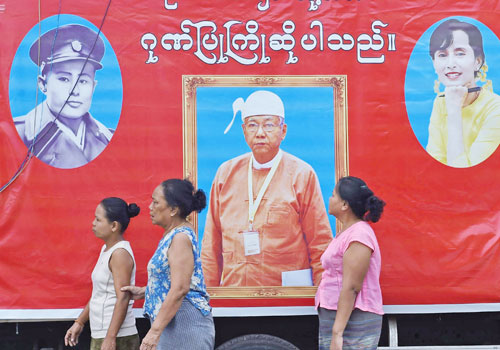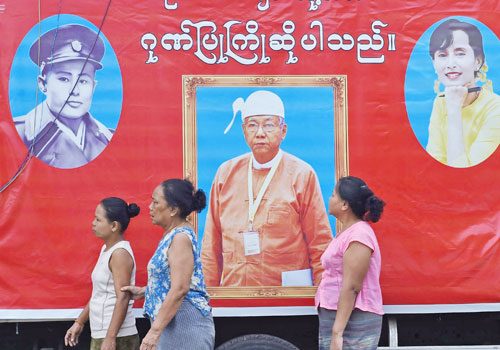
Relatives and sympathisers of political prisoners wait outside Insein Prison in Yangon on 8 April in front of a banner bearing the portraits of President U Htin Kyaw, Daw Aung San Suu Kyi and Bogyoke Aung San. Photo: AFP
This column was published in The Myanmar Times on Monday, 25 April 2016.
One of the things I love about Thingyan is that we can all get involved. It doesn’t matter who you are – rich or poor, old or young, local or foreign – everyone is united as one soggy mess.
Of course, the holiday does not last for long. The end of Thingyan signals that Myanmar is, once again, getting busy.
For farmers, that means fields must be prepared and crops planted. Students will steel themselves for more classes and exams. Businesses need to get their stock in order, hopeful of a bumper year to come.
For everyone, there is more work to do. But the people with the heaviest workload this year are Myanmar’s politicians.
Elected to legislatures the length and breadth of the country, they now need to deliver on their promises of more inclusive and efficient government. Democracy, so long a rallying cry for the disenchanted, needs to become a system of carefully allocated resources and socially attuned intervention.
The flaws of democratic governance are evident enough. One of the risks, especially after so much national grief, is that big personalities crowd out the ordinary, grinding business of political and economic reform.
Too much attention to personalities can lead to misjudgements about what really counts. It is easy to get caught up in the endless jockeying for position. The advantage, for those involved, is that it is a never-ending story.
Daw Aung San Suu Kyi still appears to revel in this highly personalised political drama. Of course, it offers particular advantages for Myanmar’s most popular leader and most famous face. Her image is the National League for Democracy’s greatest asset and everyone else in the party necessarily falls under her shadow.
Over the past few months, millions of words were spilled speculating on the people who would take key positions in the new government.
Such discussions about NLD appointments to top jobs continually return to her personal preferences. The selection of U Htin Kyaw as president reinforces this pattern.
Yes, knowing about the personalities is important, but that should not distract from what is really at stake: institutions, systems, ideas, and cultures.
If Myanmar is going to succeed in the next phase of its democratic transition, then far more emphasis will need to be put on the development of those more abstract concerns.
For its part, the NLD is yet to establish an institutionalised, ideas-driven culture that will support its success in government.
Myanmar’s most successful political institution, the military, appears to understand what is required. The names of the top generals change and their subordinates cycle through different positions, but the Tatmadaw has managed to regenerate time and time again.
The military’s long-term dominance does not happen by accident, and it is a mistake to assume that a single person is responsible for the durability of military power. Perhaps the starkest example of this military mindset is the 2008 constitution.
We should not forget that the constitution’s supreme purpose is to mitigate threats to the army’s institutional role. Pro-democracy agitation was one of those threats. In less than a decade it has been almost entirely removed from the equation. The military, as the dominant political institution, is what remains.
So, how might the NLD want to respond this year? First, it needs to quickly adjust to today’s conditions.
It is not a coincidence that Myanmar’s democrats took power at precisely this moment in history.
As the rest of the world embraced the opportunities of globalised, digitised futures, Myanmar was left in the slow lane. Six years ago, on the eve of the transformation, this was apparent to everyone, including to those who were running the military dictatorship.
Compared to the rest of Southeast Asia, Myanmar had fallen well off the global pace. Its parlous condition was not sustainable, partly because the difference in standards of living between Myanmar and its neighbours ensured a constant flow of outward migration.
But now, the pace of change inside Myanmar is unrelenting. Look around. It is pulse-racing, bruising, unsettling – and unfinished.
On almost every street in the country, you find signs that the old ways are being crushed and dismantled. What is rising in their stead will take time to build and then to settle. The new normal is fast-paced change with unpredictable consequences.
For a society that became too accustomed to waiting and watching as the rest of the world took giant leaps, there is a palpable sense that this year Myanmar’s time has come. With new technologies, the ordinary limits to rapid economic, social and cultural change may need to be revised.
But for this to work in the long-term, the NLD’s politics will need to be de-personalised and new systems put in place that will not require small groups of heroes to make things happen.
Nicholas Farrelly is director of the Myanmar Research Centre at the Australian National University and co-founder of New Mandala. His column appears in The Myanmar Times each Monday.
 Facebook
Facebook  Twitter
Twitter  Soundcloud
Soundcloud  Youtube
Youtube  Rss
Rss 